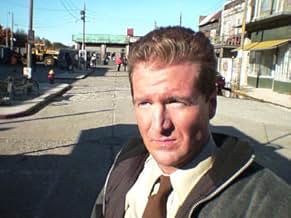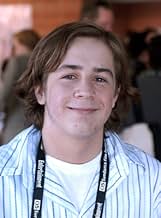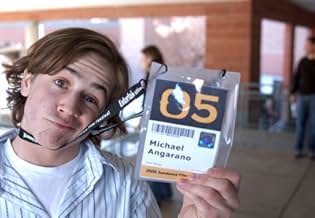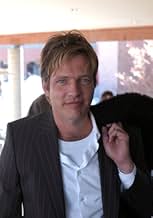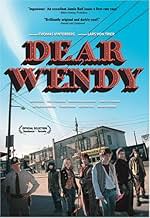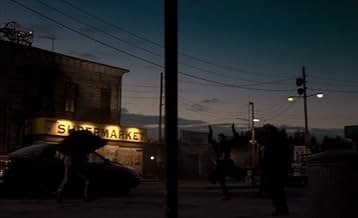IMDb-BEWERTUNG
6,5/10
10.595
IHRE BEWERTUNG
Ein kleiner Junge in einer namenlosen, zeitlosen amerikanischen Stadt gründet eine Bande von jugendlichen Außenseitern, die in ihrer Liebe zu Waffen und ihrem Ehrenkodex vereint sind.Ein kleiner Junge in einer namenlosen, zeitlosen amerikanischen Stadt gründet eine Bande von jugendlichen Außenseitern, die in ihrer Liebe zu Waffen und ihrem Ehrenkodex vereint sind.Ein kleiner Junge in einer namenlosen, zeitlosen amerikanischen Stadt gründet eine Bande von jugendlichen Außenseitern, die in ihrer Liebe zu Waffen und ihrem Ehrenkodex vereint sind.
- Auszeichnungen
- 1 Gewinn & 5 Nominierungen insgesamt
Empfohlene Bewertungen
"Dear Wendy" comes from the talents that brought us "Festen" and "It's All About Love" (both written and directed by Thomas Vinteberg), "Dogville," "Dancer in the Dark" and "Breaking the Waves" (written and directed by Lars Von Trier). They have collaborated on Dear Wendy, with Vinteberg at the helm and penned by Trier.
This is my favorite kind of movie; it begins with a "what if..." premise, which the storytellers follow with relentless commitment. In this case, the premise is "what if some misfit kids fell in love with their guns." Well, they'd give them names, they'd practice shooting and have a secret clubhouse, they'd study the famous gun-toting heroes of old, and the relationship they have with their weapons would become a mirror for their relationships with the world. All of which are pursued beautifully in the film.
Quite a few American movie critics read this film as a critique of American society, and they resent a European making a film about small-town America. An oft-vented complaint is that Trier has no business criticizing a country which he's never actually visited. I don't think, however, that this is ultimately a film about guns; the relationship these kids have with their guns is simply a unique window through which the filmmakers have chosen to show us the rich inner lives of the protagonists. They could have used a dysfunctional family (Festen), or movie musicals (Dancer In The Dark) or a tolling church bell (Breaking The Waves) to show us that world - but in this case it's guns.
Within the limits of the film medium - 10,000 words of dialog and around 140,000 frames of film - the choices of the filmmaker often revolve about what to leave OUT rather than what to put IN. This is a film that could be used as a textbook for economists. The script is tight - not a word out of place, although the narration feels conversational and casual. A film about child misfits and their guns could easily follow thematic red herrings all over the place in pursuit of social commentary, but "Dear Wendy" is utterly restrained - in spite of the "loaded" subject matter. On the cutting room floor are social commentary, cliché, and many of the cinematic crutches which Trier and Vinterberg rejected in their Dogme 95 days.
Any film lover who cares to see a film utterly committed to its premise, a film made with economy and efficiency, a film full of sweet irony, a film of deceptive simplicity, would do well to check out "Dear Wendy."
This is my favorite kind of movie; it begins with a "what if..." premise, which the storytellers follow with relentless commitment. In this case, the premise is "what if some misfit kids fell in love with their guns." Well, they'd give them names, they'd practice shooting and have a secret clubhouse, they'd study the famous gun-toting heroes of old, and the relationship they have with their weapons would become a mirror for their relationships with the world. All of which are pursued beautifully in the film.
Quite a few American movie critics read this film as a critique of American society, and they resent a European making a film about small-town America. An oft-vented complaint is that Trier has no business criticizing a country which he's never actually visited. I don't think, however, that this is ultimately a film about guns; the relationship these kids have with their guns is simply a unique window through which the filmmakers have chosen to show us the rich inner lives of the protagonists. They could have used a dysfunctional family (Festen), or movie musicals (Dancer In The Dark) or a tolling church bell (Breaking The Waves) to show us that world - but in this case it's guns.
Within the limits of the film medium - 10,000 words of dialog and around 140,000 frames of film - the choices of the filmmaker often revolve about what to leave OUT rather than what to put IN. This is a film that could be used as a textbook for economists. The script is tight - not a word out of place, although the narration feels conversational and casual. A film about child misfits and their guns could easily follow thematic red herrings all over the place in pursuit of social commentary, but "Dear Wendy" is utterly restrained - in spite of the "loaded" subject matter. On the cutting room floor are social commentary, cliché, and many of the cinematic crutches which Trier and Vinterberg rejected in their Dogme 95 days.
Any film lover who cares to see a film utterly committed to its premise, a film made with economy and efficiency, a film full of sweet irony, a film of deceptive simplicity, would do well to check out "Dear Wendy."
Thomas Vinterberg has finally reemerged from the disaster that was "It's all about love", and with help from compatriot Lars Von Trier he has delivered a hugely original and entertaining film. The story evolves around Dick - a small town loser who feels confident by holding a gun. Seeing this, he creates a group "the Dandies" of fellow gun-fanatics. Violent as it may seem, the point of the group is pacifism - to obsess with guns, but NOT TO USE THEM. Yet when ex-criminal Sebastian joins the group tensions emerge, and Dicks ego and his gun-obsession becomes a deadly cocktail. The story is absolutely outrageous, but Vinterberg, realizing this, gives the film a warped, almost giddy, feel. This actually complements Von Trier's screenplay better than the latter's ultra-realistic style, and prevents the film from becoming moralizing. The only real drawback of the story is the slow start and the dialog, which at times has difficulty hiding the fact that it has, in fact, been translated from Danish into English. Nevertheless, a strong comeback for Vinterberg - let's hope he can do some more serious stuff as well.
All of this recent fuss about David Cronenberg's film, "A History of Violence." What rot. You want a good film about violence and the gun culture in America? Check out this little gem from the co-founders of Denmark's Dogme 95 movement: Thomas Vinterberg ("The Celebration"), who directed this film, and Lars von Trier, who wrote the screenplay.
Von Trier drives many American film critics absolutely bonkers because he has the temerity to make films about the "American Character," even though he apparently has never set either of his personal feet on U.S. soil. First came "Dancer in the Dark," set in central Washington State, then "Dogville," set somewhere in the Colorado Rockies. (The actual locations were European, as is the case in Dear Wendy.) These earlier films may have had their problems, but they nonetheless stung with their unflattering depictions of American hypocrisy, greed, violence and injustice.
The worst thing you can say about von Trier's depictions is that they are derivative, hardly novel or unique. Think of Nathaniel Hawthorne, or Theodore Dreiser, or Ralph Ellison, or Don DeLillo , or David Foster Wallace, or any number of other authors. Pick from almost any generation of American writers and you'll find these same themes sounded. Because like it or not - they are valid. And it should come as no surprise that some intelligent foreigner who reads deeply about America might be capable of writing a credible screenplay about our national foibles.
"Dear Wendy" is set in an unnamed mining town sometime before the present day, probably the 1960s, judging from the musical soundtrack. The town is obviously a false set, not a natural location (odd since this violates of one of Dogme 95's central tenets, to always use natural locations). A miner's son, Dick Dandelion (Jamie Bell, who has carved out a niche, it seems, playing miner's sons, beginning with his splendid performance in Billy Elliot) is a misfit, too fragile and disinterested to spend his life down the mines. Out of sorts, aimless, Dick one day buys a toy gun as a gift for a buddy. But he learns from his fellow misfit friend Stevie (Mark Webber) that this gun is actually a small but real bullet shooting weapon. Stevie, as it happens, has an obsessive passion for guns, gun history and the workings of guns.
These two hit upon a plan: why not start a little club, a cult of losers and outcast young people, the town's stray kids, and bring a little honor, pride and some decent principles of conduct into their lives. No one else is going to give them a break, so it's self-help time. The club will have a secret headquarters for meetings, indoctrination and just hanging out. The unifying themes will be the possession and adulation of firearms juxtaposed with pacifism (is this an amusingly ironic riff on our culture or what ?!) Members will learn to love their guns, to name them, to vivify imagined relationships to their guns. But they will also be honor bound never to use them to commit violent acts against others, not to mention each other.
The group is named The Dandies, presumably after Dick's surname, and grows to include Susan (Alison Pill), Huey (Chris Owen), Freddie (Michael Angarano), and Sebastian (Danso Gordon). An aging black woman, Clarabelle (Novella Nelson), eventually becomes a sort of honorary member, or, more precisely, someone whom The Dandies find need to protect from harm, once the going gets rough.
And the going does get rough. We know that it will only be a matter of time before the idyllic fantasy life shared by this noble little band is somehow shattered by violence. This force arrives in the form of Sheriff Krugsby (Bill Pullman) and a legion of police sharpshooters. It's the gunfight at the Not Very OK Corral. Without getting into further particulars, I will say that the final shootout between The Dandies and Pullman's legion is conducted with an awesome display of police firepower that absolutely resembles the massive use of high tech weaponry that we are accustomed to witnessing when America goes to war, whether abroad or in quelling domestic uprisings (think of Fallujah and Waco).
All the actors I have named deliver good turns. I was especially impressed by Bill Pullman, Jamie Bell and Mark Webber. The sound track features several songs by the 60s British pop/rock band, The Zombies, including their great hits, "She's Not There" and "Time of the Season." More than anything, to me this film feels a lot like a couple of Gus Van Sant's movies. The Dandies adopt period costumes as well as arcane, stylized manners like the street people in "My Own Private Idaho," and the notion of outcast young people bearing weapons, of course, permeates "Elephant," in a similarly lyrical manner.
I think "Dear Wendy" is a powerful film, brimming with poetic truth about us. Yes, it is polemical, one sided, provocative. It may be only half the truth, ignoring our national virtues. And the slant may be familiar. But Vinterberg and von Trier have teamed up to make a decent movie about our seemier side. (In English). My rating: 8/10 (B+). (Seen on 12/11/05). If you'd like to read more of my reviews, send me a message for directions to my websites.
Von Trier drives many American film critics absolutely bonkers because he has the temerity to make films about the "American Character," even though he apparently has never set either of his personal feet on U.S. soil. First came "Dancer in the Dark," set in central Washington State, then "Dogville," set somewhere in the Colorado Rockies. (The actual locations were European, as is the case in Dear Wendy.) These earlier films may have had their problems, but they nonetheless stung with their unflattering depictions of American hypocrisy, greed, violence and injustice.
The worst thing you can say about von Trier's depictions is that they are derivative, hardly novel or unique. Think of Nathaniel Hawthorne, or Theodore Dreiser, or Ralph Ellison, or Don DeLillo , or David Foster Wallace, or any number of other authors. Pick from almost any generation of American writers and you'll find these same themes sounded. Because like it or not - they are valid. And it should come as no surprise that some intelligent foreigner who reads deeply about America might be capable of writing a credible screenplay about our national foibles.
"Dear Wendy" is set in an unnamed mining town sometime before the present day, probably the 1960s, judging from the musical soundtrack. The town is obviously a false set, not a natural location (odd since this violates of one of Dogme 95's central tenets, to always use natural locations). A miner's son, Dick Dandelion (Jamie Bell, who has carved out a niche, it seems, playing miner's sons, beginning with his splendid performance in Billy Elliot) is a misfit, too fragile and disinterested to spend his life down the mines. Out of sorts, aimless, Dick one day buys a toy gun as a gift for a buddy. But he learns from his fellow misfit friend Stevie (Mark Webber) that this gun is actually a small but real bullet shooting weapon. Stevie, as it happens, has an obsessive passion for guns, gun history and the workings of guns.
These two hit upon a plan: why not start a little club, a cult of losers and outcast young people, the town's stray kids, and bring a little honor, pride and some decent principles of conduct into their lives. No one else is going to give them a break, so it's self-help time. The club will have a secret headquarters for meetings, indoctrination and just hanging out. The unifying themes will be the possession and adulation of firearms juxtaposed with pacifism (is this an amusingly ironic riff on our culture or what ?!) Members will learn to love their guns, to name them, to vivify imagined relationships to their guns. But they will also be honor bound never to use them to commit violent acts against others, not to mention each other.
The group is named The Dandies, presumably after Dick's surname, and grows to include Susan (Alison Pill), Huey (Chris Owen), Freddie (Michael Angarano), and Sebastian (Danso Gordon). An aging black woman, Clarabelle (Novella Nelson), eventually becomes a sort of honorary member, or, more precisely, someone whom The Dandies find need to protect from harm, once the going gets rough.
And the going does get rough. We know that it will only be a matter of time before the idyllic fantasy life shared by this noble little band is somehow shattered by violence. This force arrives in the form of Sheriff Krugsby (Bill Pullman) and a legion of police sharpshooters. It's the gunfight at the Not Very OK Corral. Without getting into further particulars, I will say that the final shootout between The Dandies and Pullman's legion is conducted with an awesome display of police firepower that absolutely resembles the massive use of high tech weaponry that we are accustomed to witnessing when America goes to war, whether abroad or in quelling domestic uprisings (think of Fallujah and Waco).
All the actors I have named deliver good turns. I was especially impressed by Bill Pullman, Jamie Bell and Mark Webber. The sound track features several songs by the 60s British pop/rock band, The Zombies, including their great hits, "She's Not There" and "Time of the Season." More than anything, to me this film feels a lot like a couple of Gus Van Sant's movies. The Dandies adopt period costumes as well as arcane, stylized manners like the street people in "My Own Private Idaho," and the notion of outcast young people bearing weapons, of course, permeates "Elephant," in a similarly lyrical manner.
I think "Dear Wendy" is a powerful film, brimming with poetic truth about us. Yes, it is polemical, one sided, provocative. It may be only half the truth, ignoring our national virtues. And the slant may be familiar. But Vinterberg and von Trier have teamed up to make a decent movie about our seemier side. (In English). My rating: 8/10 (B+). (Seen on 12/11/05). If you'd like to read more of my reviews, send me a message for directions to my websites.
This flick, with its subtle views on America's obsession with weapons, is likely not going to be a crowd pleaser. One of the main reasons for this is the films use of highly symbolic mise-en-scene takes several viewings to fully appreciate. Another reason for the let down is that some might be inclined to want more action for a movie that centralizes on guns.
However, this movie is brilliant. The shot composition, the editing, the acting-this movie is very well pieced together. Also, as for the meaning of the movie, it goes in a direction that is a really provocative and fresh. I would highly recommend that you give this movie a chance, and keep an open mind. I have never been a fan of the director of this film or the writer, but I was deeply pleased by this film.
However, this movie is brilliant. The shot composition, the editing, the acting-this movie is very well pieced together. Also, as for the meaning of the movie, it goes in a direction that is a really provocative and fresh. I would highly recommend that you give this movie a chance, and keep an open mind. I have never been a fan of the director of this film or the writer, but I was deeply pleased by this film.
I saw this movie in France with a large group of friends, something I highly recommend. We all seemed to have a different take on the film and each of us was able to draw something unique from it. Some loved it; some hated it. One of us focused on the powerful characters, another on the coming-of-age aspect, another on the gun control issues, etc. I saw it as a commentary on the power of fear in light of current world events and about how allowing that fear to control your life can ultimately bring about the very tragedy of which you are most afraid.
Dear Wendy certainly lends itself well to conversations that surpass the standard post-movie fare. I am looking forward to it coming stateside so I can see it again with other friends and see what reactions the film provokes in them ...
Dear Wendy certainly lends itself well to conversations that surpass the standard post-movie fare. I am looking forward to it coming stateside so I can see it again with other friends and see what reactions the film provokes in them ...
Wusstest du schon
- WissenswertesIn Lars von Trier's script, the main characters were in their 20s. Director Thomas Vinterberg decided to change it, so they became children instead. Lars von Trier later stated that he thought the age change was a brilliant idea.
- PatzerThe plan of Electric Square labels "CENTRE POLE" using the British rather than the American spelling. The film was shot in Denmark and Germany rather than in West Virginia, USA.
- VerbindungenFeatured in Letters to Dear Wendy (2005)
- SoundtracksShe's Not There
Written and Performed by The Zombies
Zombies Heaven, "Begin Here & Singles" (c)
Courtesy of Marquis Enterprises
Top-Auswahl
Melde dich zum Bewerten an und greife auf die Watchlist für personalisierte Empfehlungen zu.
- How long is Dear Wendy?Powered by Alexa
Details
- Erscheinungsdatum
- Herkunftsländer
- Offizielle Standorte
- Sprache
- Auch bekannt als
- Calles peligrosas
- Drehorte
- Produktionsfirmen
- Weitere beteiligte Unternehmen bei IMDbPro anzeigen
Box Office
- Budget
- 50.000.000 DKK (geschätzt)
- Bruttoertrag in den USA und Kanada
- 23.106 $
- Eröffnungswochenende in den USA und in Kanada
- 8.222 $
- 25. Sept. 2005
- Weltweiter Bruttoertrag
- 607.229 $
- Laufzeit1 Stunde 45 Minuten
- Farbe
- Sound-Mix
- Seitenverhältnis
- 1.66 : 1
Zu dieser Seite beitragen
Bearbeitung vorschlagen oder fehlenden Inhalt hinzufügen



